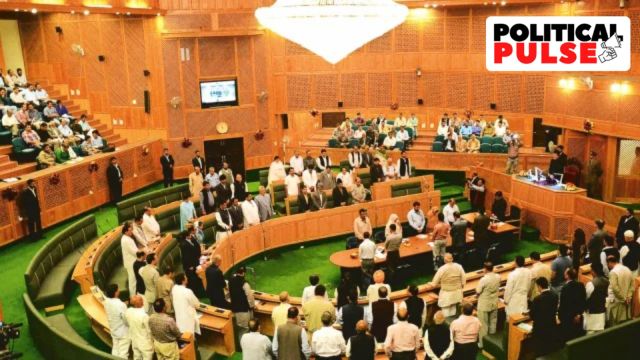J&K countdown begins, hits 5: Parties to legal experts, no clarity on nominated members
Exit polls add to apprehension that no group may get clear majority, which would make role of nominated members, who nominates them, and in consultation with whom, crucial.
 The addition of the five nominated members, who are to have the same powers and voting rights as other MLAs, would take the total J&K House strength to 95, and the majority mark to 48. (File photo)
The addition of the five nominated members, who are to have the same powers and voting rights as other MLAs, would take the total J&K House strength to 95, and the majority mark to 48. (File photo)WITH THE exit polls also indicating that no party or coalition may end up with a simple majority in Jammu and Kashmir, the confusion regarding the five members to be nominated to the Assembly by the Lieutenant Governor has parties worried.
As more Opposition leaders came forward to say that Lt Governor Manoj Sinha should not be making the nominations without the “aid and advice” of the Council of Ministers that is to be sworn in soon, the BJP has said he is clearly not required to as per the J&K Reorganisation Act. Several legal experts The Indian Express spoke to also differed over what the changes implied.
The addition of the five nominated members, who are to have the same powers and voting rights as other MLAs, would take the total J&K House strength to 95, and the majority mark to 48. Most exit polls Saturday gave the National Conference-Congress alliance – the frontrunner – less than that figure.
As per senior administration officials who refused to come on record, after the results are announced on October 8, three notifications will follow – one, for the constitution of the Assembly; second, for the return of powers to the Council of Ministers from the administrative secretaries; and third, the nomination of members.
The NC’s state spokesperson Imran Nabi Dar told The Indian Express: “As a precedent, this (the nomination) has to be done by the elected government, not by somebody who is himself a nominated person, in this case, the LG.”
Dar added that his party believed the Centre would not bypass the elected government. “If it is done, it would have implications on government formation. The LG does not have the authority to appoint members without the Council of Ministers being in place,” he said.
Senior PDP leader and former minister Mehboob Beig said that nomination of members without a Council of Ministers being in place would mean “the BJP disrespecting or diluting the mandate of the people”. “If the number of seats is fixed at 90, how can they bring five more people from outside to decide the fate of the elected government? They should not do this.”
“The most empowered” state of India, due to the special powers it enjoyed under Article 370, had already been downgraded to a Union Territory, Beig noted. Now that an election has finally been conducted, “the results should be respected”, he said.
The chief spokesperson of the BJP in Jammu, Sunil Sethi, claimed there was no confusion on the issue. “The provisions of the J&K Reorganisation Act are very clear. We are following the Puducherry model and there the Centre has the power to nominate members.”
According to Sethi, those spreading confusion over the matter are applying provisions applicable to J&K when it was a state. It is clear now that “nomination (of members to the Assembly) by the LG is to be on the advice of the Home Ministry”, he said. Even though the Act itself does not specify this, Sethi said, “because the LG is the nominee of the Centre, it will be on the advice of the Union Home Ministry”.
Sethi also argued that since the five members have the right to vote, “they also have the right to vote for government formation, and that cannot be on the advice of the Council of Ministers”. “So they have to be nominated along with the constitution of the Legislative Assembly itself.”
Passed after the abrogation of Article 370, the scrapping of special status and the division of J&K into two Union Territories, the J&K Reorganisation Act, cleared in 2019 by Parliament, specified that the LG – now the administrative authority – “may nominate two members to the Legislative Assembly” to give representation to women “if, in his opinion, women are not adequately represented in the Legislative Assembly”.
Then, in 2023, an amendment was made to the Act, allowing for the nomination of three more members to the Assembly – two from the “Kashmiri migrant community”, one of whom has to be a woman; and one from “displaced persons from Pakistan-occupied Jammu and Kashmir”.
Asked about what the changes implied, former J&K law secretary Mohammad Ashraf Mir pointed to how the rules governing this had changed. When J&K had its own Constitution, on all matters except those covered by Sections 36, 38 and 92 – on appointment of ministers, deputy ministers and imposition of Governor’s rule – “the Governor (was required to) act only on the aid and advice of ministers”. The matter of nomination of members was governed by Section 47, and hence it required the Governor to consult the Council of Ministers, Mir said.
Then, the J&K Assembly had two nominated members, who were named after government formation and on the advice of the government of the day.
But now the situation was different, Mir said. “There is (the J&K) Reorganisation Act and it states that the LG will act on the aid and advice of ministers in respect to matters where the state Legislature has the power to make laws. The rest is within his discretion.” The issue of nomination is “not within the powers or competence of the elected Assembly”, he said, meaning the LG had the discretion to nominate members to the Assembly.
However, Shariq Riyaz, a lawyer practising in the J&K High Court as well as the Supreme Court, does not agree that the LG has power to “unilaterally nominate members to the Legislative Assembly”. “This is covered by a direct entry in the State List under the Seventh Schedule, as per which he has to act only on the ‘aid and advice’ of the Council of Ministers of the incoming government. Any misadventure must be interdicted in courts.”
On the parallel drawn with Puducherry, where three members are nominated to the Union Territory’s Assembly by the Central government, Riyaz said: “Puducherry was always a UT, while J&K was a state that has been reorganised as a UT. Plus, in Puducherry, the Act states that the nomination (of members) will be by the Central government. The J&K Reorganisation Act states that the LG will nominate.”
On the Central government’s role, Riyaz said that it has powers with regard to police, public order and the Union List. Additionally, he said, all these powers can be exercised only when the Assembly is in session. “Nomination can’t be done today, when the Assembly is not yet born.”
- 01
- 02
- 03
- 04
- 05






























